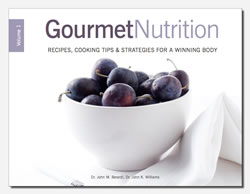Tips On Carbs – What To Eat At the Right Time
 If you want to lose fat, gain muscle, and improve performance, it makes sense to go to the experts who have achieved this with themselves and with thousands of clients.
If you want to lose fat, gain muscle, and improve performance, it makes sense to go to the experts who have achieved this with themselves and with thousands of clients.
For nutrition, there may be no one better than Dr. John Berardi. I ask John about nutrition every chance that I get because he knows a lot about what is arguably the most important part of the fat loss equation – NUTRITION.
Dr. Beradi is defiantly one of the respected authorities on fitness and nutrition. He has a list of accomplishments that are long and distinguished. Just to mention a few, currently he is a professor at University of Texas at Austin. He holds Ph.D. in Exercise Biology & Nutrient Biochemistry from the University of Western Ontario, has authored three books, including Gourmet Nutrition and is a former national level bodybuilder.
Today the expert shares a few of his precision guidance tips when it comes to fat loss and exercising.
********************
CRAIG BALLANTYNE: John, what are some of the latest practical tips you have come across that can help the everyday, pressed-for-time men and women stick to their nutrition plan and help them lose fat and gain muscle?
JOHN BERARDI: Well, when it comes to practical tips, I like to separate my advice into two categories – food tips and lifestyle tips. Both categories are essential for overall results.
Sure, what we eat is absolutely critical – but knowing what to eat is only part of the battle. Having the right foods available at the right times is just as critical as knowing what to eat. So really, we’re talking about both knowing AND doing.
In terms of food tips, the most important tip – far and away – is the idea that carbohydrate intake should be activity-dependent.
This is similar to my 4th habit of the Precision Nutrition plan, and it goes like this — Non-fruit and non-veggie carbs should be saved until the during- and post-exercise periods. So, simply put, the typical recreational exerciser saves his or her starches (pasta, bread, oatmeal, rice, etc.) and sugary carbs (sweets, recovery drinks, sports drinks, etc.) until they’re exercising or immediately after. The rest of the day is for proteins, good fats, and lots of veggies (along with some fruits).
By following this rule, my typical clients see BIG, IMMEDIATE body comp changes! And, truly, this tip has been the biggest in terms of body composition impact for my recreational exercisers, since they’re typically only exercising 3-4 times per week.
In terms of lifestyle tips, my compliance grid is a huge one.
CRAIG BALLANTYNE: Yes, I’ve heard a lot about your “compliance grid”. What is this and how can people use this to gauge their commitment? What do you learn when you have a client complete this?
JOHN BERARDI: The compliance grid has been a huge help in terms of helping clients stick to either what they already know to be good nutrition (for those who are well-read in this area) or to what they’re learning to be good nutrition (for those new to the Precision Nutrition principles).
The compliance grid basically helps a client plot out 1 week of their life and keeps track of how well they’re doing nutritionally. In simple terms, we create a table in which the seven days of the week are plotted along the vertical axis (far left column) and the 7 meals of the day are plotted along the horizontal axis (top row).
Then, if a person eats a Precision Nutrition compliant meal, they place an “X” in the corresponding box. If they miss a meal, they place an “O” in the box. And if they have a non-compliant meal, they place a “*” in the appropriate box. This very simple and easy-to-use compliance system helps folks gauge their commitment and regular adherence by giving an honest and accurate assessment of how well they’re REALLY doing.
You see, many folks – in their minds – count their hits but fail to count their misses. This makes them believe they’re doing FAR better than they really are. So the compliance grid forces them to count both hits and misses – helping them avoid “blind spots.”
We often have clients who swear that they’re at 90% compliance (the gold standard for Precision Nutrition) and then, upon using the compliance grid, find out that they’re really at 50% or 60%. This is eye-opening and shows them that there is indeed room for improvement.
That’s all for today. Join us in Part 2 of this interview series with Dr. Berardi where we’ll learn how the average man and woman can eat healthy without breaking the bank.
In fact, Dr. Berardi’s tips will save you money while allowing you to eat better for fat loss.
Craig Ballantyne, CSCS, M.Sc.
Contributor, Men’s Health Magazine
CB Athletic Consulting, Inc.